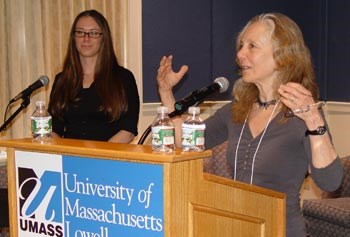Occupy Boston Participants Speak Out

04/09/2013
By Sandra Seitz
Scratch under the surface of any activist movement and you will find that women are both vital participants and ignored for their contributions. From the early days of the labor movement in America to the recent Occupy protests and encampments, women have been organizing for economic justice. A recent campus forum brought their role front and center.
“We Are the 99 Percent: Women Organizing for Economic Justice” was the theme of this year’s annual forum sponsored the Center for Women and Work and the Work, Labor and Society program at UMass Lowell.
“Throughout history women have taken a leading role in the struggle for economic and social justice,” says Mignon Duffy, associate professor of sociology. “Whether in the streets or in the ballot box, women’s voices demand to be heard.”
Women’s Caucus of Occupy Boston
Women who participated in Occupy Boston also found they had common cause in getting their voices heard. Early in the four-month encampment, they created a Women’s Caucus. Three of its members spoke to the forum.
“We dealt with issues within the camp and within our society,” said Rachel McNeill, an Iraq veteran who participated in Occupy Boston's efforts from the beginning. “The environment of the camp felt familiar to me, coming from the military, with people of diverse backgrounds joining together for a common purpose.”
“I’d worked on anti-rape initiatives (before Occupy) but I still needed a place to talk about the material realities of women’s lives — the economics, our work conditions,” said Nicole Sullivan, founder of the collective Boston Feminists for Liberation.
“I felt compelled to join the Women’s Caucus of Occupy Boston to support leadership of women in the Occupy movement, to challenge problems of sexism and sexual harassment at the encampment and to speak out about the impact of our economy and social policies on women,” said Mindy Fried, an activist veteran of the 1970s women’s movement.
What did Occupy Boston accomplish?
“The main accomplishment was an invisible one,” said Sullivan. Instead of working on a single issue, such as sexual violence, “we formed connections with other activists and we made connections to other issues. For example, economic justice isn’t just about the glass ceiling, it’s also about low-wage workers. The camp itself was the beginning of a much larger struggle for justice.”
Many Occupy Boston activists have gone on to work with anti-foreclosure groups, such as City Life. Rachel has joined Operation Jubilee, a non-profit with an innovative program of debt forgiveness for low-wage workers.
Inspiration, Organization and Song
The forum included a multimedia, multi-participant presentation led by Bev Grant, a Brooklyn-based activist and labor singer/songwriter, to honor women in labor movements throughout American history. Student-led roundtables introduced a number of statewide organizations that promote justice in economic policy, such as the Domestic Workers Alliance.
Leaders of the Center for Women and Work presented three Splash! Awards to women who have advanced economic justice for women in the region. Awards went to Budget Buddies, an organization to improve financial literacy of low-income women through workshops and one-on-one coaching; to Evelyn Murphy, founder and president of the WAGE Project, Inc., a national organization to end wage discrimination against working women; and to women leaders of Local 1596 of the union of adjunct faculty, to advance economic justice and working conditions for adjunct faculty.
